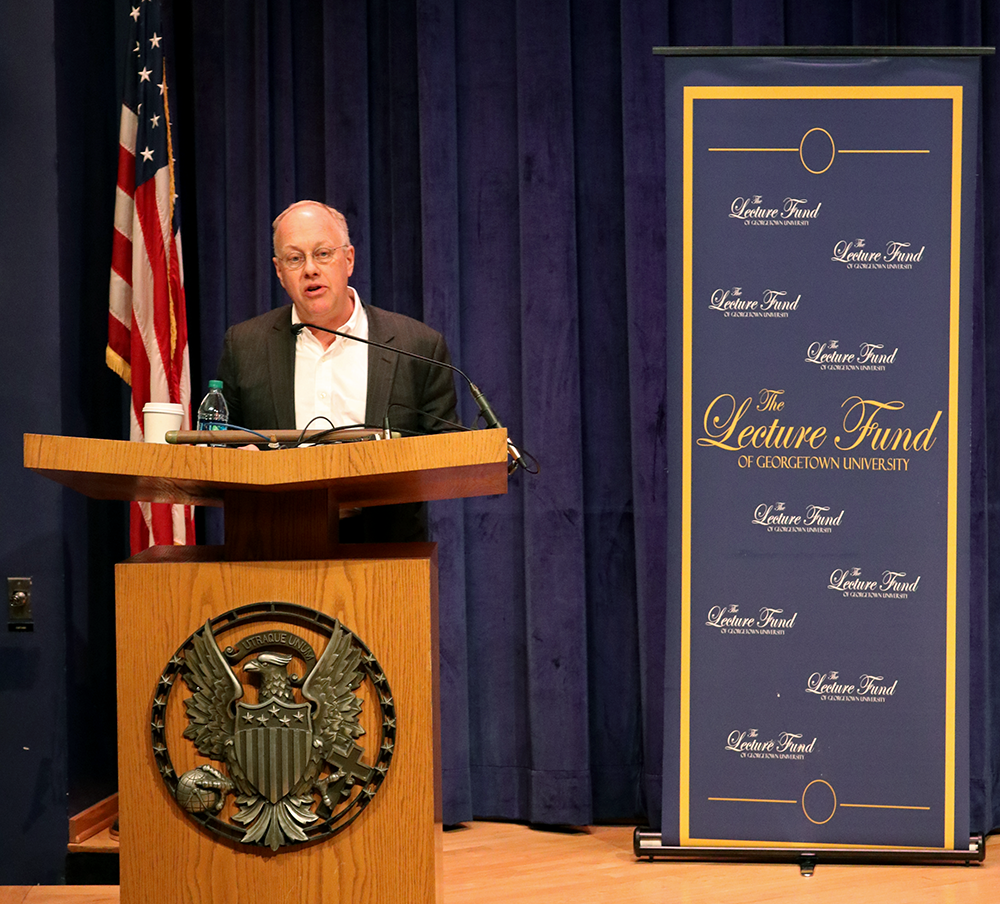Income inequality and the influence of corporate lobbyists in politics have caused a societal decline in the United States, said Chris Hedges, a Pulitzer Prize winner and former New York Times reporter, Monday.
Hedges served as a foreign correspondent for The New York Times for 15 years, resigning after receiving a reprimand from The Times for publicly criticizing the Iraq war in 2003. In 2002, Hedges received a Pulitzer Prize for explanatory reporting as part of a Times reporting team that profiled global terrorism both before and after the September 11 terrorist attacks.

After leaving The Times, Hedges became a senior fellow at the Nation Institute, a nonprofit media organization, and a weekly columnist for online news website Truthdig. Hedges has also written 14 books since 2002.
The discussion on Monday focused on Hedge’s latest book, America: The Farewell Tour, which was published last August. The Farewell Tour explores the detrimental effects of corporate influence in politics and flawed democracy on society.
Increasing economic disparity between middle class Americans and the corporate elite has closed off opportunities for the middle class, according to Hedges.
“The old rules, imperfect and often untrue for poor people of color, nevertheless were not a complete fiction in the United States,” Hedges said. “They offered Americans, especially those from the white, working and middle class modest social and economic advancement.”
The wealthiest one percent held 66.7 percent of the wealth in the United States in 2016, compared to 54.6 percent in 1962, while the share held by the bottom 90 percent has dropped to 21.2 percent, according to Inequality.org, a project of the think tank Institute for Policy Studies.
The growing income inequality is one reason that leaders such as President Donald Trump gained popularity, though impeaching Trump would not resolve the disparity, Hedges said.
“Removing Trump from office without confronting the rulelessness that defines the lives of tens of millions of Americans would do nothing to restore our democracy,” Hedges said. “In fact, it would probably consolidate the power of a Christianized fascism that cloaks itself in a false morality.”
The war in former Yugoslavia, where demagogues pandered to the ethnic biases of an enraged population, was another example of decay of social order observed in his reporting, according to Hedges, who covered the war in former Yugoslavia while serving as the bureau chief of the Balkans from 1995 to 1998.
“Demagogues, and I saw this in Yugoslavia, arise from failed democracies plagued by rulelessness,” Hedges said. “They tell an enraged population what it wants to hear and crudely, to the delight of the betrayed, ridicule the elites who sold them out.”
Held in the Intercultural Center Auditorium, the event was hosted by the Lecture Fund as the organization’s 11th annual Michael E. Jurist Memorial Lecture. The memorial lecture series is held every year to honor the legacy of the late Michael Jurist (SFS ’07), who worked as Lecture Fund chair from 2006 to 2007. Previous speakers in this series have included former White House photographer Pete Souza in 2018 and Ezra Klein, the CEO of U.S. news and opinion website Vox, in 2016.
Isabelle Hupez (SFS ’19), vice chair of finance for the Lecture Fund, highlighted Jurist’s commitment to promoting free speech in her introduction.
“As the chair of the organization, Michael shaped the mission of the Lecture Fund with his unwavering faith in the power of free speech and dialogue,” Hupez said. “That mission carries on today.”
Corporate lobbyists also exacerbate climate change and are unlikely to change their practices without pressure, according to Hedges. Hedges urged attendees to engage in nonviolent acts of civil disobedience to halt production in capital cities until the issue of climate change is addressed.
“We must, in wave after wave, carry out non-violent acts of civil disobedience to shut down the capital cities of major industrial countries, cripple commerce and transportation until the ruling elites are forced to publicly state the truth about climate catastrophe, implement radical measures to hold climate emissions by 2025, and empower citizens free of corporate control to terminate our binge on fossil fuels,” Hedges said.
Humanity has until 2030 to stop the irreparable effects of climate change that occur over 1.5 degrees celsius of warming, according to a report by the United Nations Intergovernmental Panel on Climate Change released in October. Despite this short timeframe, mitigating the effects may still be possible, according to Hedges.
“The more we free ourselves from the bondage of fear, to throw up barriers to the forced march towards ecocide, the more we will be evolved by a strange kind of euphoria, one I often felt as a war correspondent documenting horrific atrocities and suffering to shame the killers,” Hedges said. “We obliterate in the acts of our defiance, despair.”
This article was updated April 4 to correct Hupez’s position in the Lecture Fund.




















